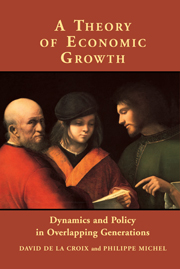2 - Optimality
Published online by Cambridge University Press: 29 October 2009
Summary
In an economy without externality and public goods, the competitive equilibrium is Pareto-optimal, provided that the numbers of goods and agents are finite. It is therefore impossible to improve the welfare of one agent without diminishing the welfare of another agent. This result is the First Welfare Theorem (Arrow (1951), Debreu (1954)).
This property is not necessarily verified when there is an infinite number of agents and goods. We shall see that in the standard model of chapter 1, the inter-temporal competitive equilibrium may or may not be Pareto-optimal. In a dynamic economy with an infinity of periods, we may distinguish two aspects of optimality. The dynamic efficiency deals with the issue of the productive efficiency when the production frontier is extended to an infinite horizon setup. The welfare of the agents depends on their life-cycle utility, and hence on the allocation of total consumption between two generations living at the same time, but also among all generations.
A natural way to study allocations is thus to proceed in three steps: feasibility, (productive) efficiency, optimality.
Another important question will be addressed. How will a central benevolent planner – that can take all the consumption and savings decisions – allocate the resources of the economy between capital accumulation, consumption of the young, and consumption of the old for each generation? After the resolution of this problem, we shall be able, in chapter 3, to characterize feasible allocations which can be decentralized by means of lump-sum transfers between generations. In particular, any Pareto-optimal allocation can be decentralized with such transfers (Second Welfare Theorem).
- Type
- Chapter
- Information
- A Theory of Economic GrowthDynamics and Policy in Overlapping Generations, pp. 72 - 128Publisher: Cambridge University PressPrint publication year: 2002



